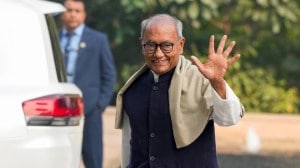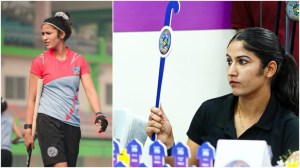Calculating the cost
There was pandemonium in the Finance Ministry the day before the Budget papers were sent to the printers, with officials busy making last-mi...

There was pandemonium in the Finance Ministry the day before the Budget papers were sent to the printers, with officials busy making last-minute revisions and re-checking figures. The ministry8217;s very sophisticated calculator notebook which can accommodate up to 18 digit figures was in great demand. The Finance Secretary searched frantically for the calculator in his office before he remembered that it had been borrowed by the Revenue Secretary. A peon was dispatched to bring back the calculator only to be told that the calculator had been taken by the Finance Minister, who required it urgently.
Considering the huge amounts at stake over a single decision by the Finance Ministry, wouldn8217;t it make sense for the ministry to invest in a few more such calculators?
Wrong match point
When informed by the Americans that President George Bush would like to participate in a very Indian pastime, the Ministry of External Affairs proposed that he watch a cricket match. Bush liked the suggestion. In fact, when asked by an Indian correspondent in Washington whether he would prefer watching a cricket match or a Bollywood movie, he came up with the pat line 8216;8216;I am a cricket person8217;8217;.
But though the idea came from us, Bush watched a cricket match in Pakistan, not India. The MEA is understandably miffed at the Pakistanis appropriating its brainwave. Still the Indian Government can take heart from the fact that while he was here Bush was too busy with work to have time for relaxation. In Pakistan, on the other hand, he had more leisure time, since he had little business to transact.
Nitpicking at ground level
While the bonhomie between George Bush and Manmohan Singh culminated in the finalisation of the nuclear deal, at the lower levels there was a running argument between Indian and American authorities during the Bush visit. The Indian Government demanded that the commercial plane hired by the US military to carry some 200 US correspondents should land at the regular Indira Gandhi airport used by all commercial flights. The Americans maintained that the plane was for all practical purposes a secured military vehicle and should land only at the Palam technical area. The Americans won this round and at the eleventh hour the pilot was instructed to change course and land at the technical area where only VIP aircraft are permitted.
At the Hyderabad House press conference the Americans objected to the positioning of the podium for Bush and Manmohan Singh. They pointed out that the two leaders would get the direct midday sun and TV cameras would not get clear visuals. The Indians dug in their heels and refused to change the location.
Vadra: a golf apart
Robert Vadra is clearly a babe in the woods in political matters. He was inveigled into giving an interview to India TV on the understanding that he would be talking about his favourite sport, golf. Not only did he pick the wrong channel 8212; India TV used to telecast a show by his estranged aunt-in-law Maneka Gandhi 8212; but the interviewer quizzed him on politics and his famous in-laws, rather than golf. Vadra kept repeating that he stayed away from politics and is focused only on his business, his family and golf.
The only political statement Vadra made was to clarify that his wife was not Priyanka Gandhi but Priyanka Vadra. 8216;8216;She is married to me now,8217;8217; he protested when the journalist kept referring to his wife as Priyanka Gandhi. In fact, he repeated the name Priyanka Vadra thrice to emphasise the point.
Lost in translation
At A press briefing a journalist asked Vijay Kumar Malhotra whether Sudheendra Kulkarni had returned as L K Advani8217;s speechwriter since he has been sighted visiting Advani8217;s parliamentary office frequently. Malhotra fobbed off the query, pointing out that Advani generally wrote his own speeches.
Actually the man who needs the services of a speechwriter, or rather of a competent English translator, is BJP president Rajnath Singh. Those who were impressed by the sincerity of Rajnath8217;s speech in Hindi on the day he formally took over as party president were shocked to find the English translation of his speech banal and inappropriate. For instance, Rajnath in Hindi had said that 8216;8216;The politics of opportunistic defections has no long-term future.8217;8217; This was translated in English to read, 8216;8216;Politicians with manipulative alliances don8217;t have long legs.8217;8217;
Different strokes
The two recent changes in the RSS organisational set-up 8212; the abolition of the post of spokesperson for the RSS and the removal of Manmohan Vaidya, who was at loggerheads with Chief Minister Narendra Modi, as Prant Pracharak of Gujarat 8212; are significant. These indicate that the RSS wants to maintain a low profile and not interfere overtly in the BJP. RSS general secretary Mohan Bhagwat was responsible for both decisions and not the Sarsanghchalak K S Sudershan. This has led to speculation that Bhagwat has virtually taken control.
Actually in this cloistered, highly secretive organisation, the day-to-day functioning has always been in the hands of the general secretary. The Sarsanghchalak8217;s post is largely ceremonial, although when he takes a major policy decision his word is final. When Rajinder Singh was the RSS chief it was Bhaurao Deoras and later H V Seshadri who really ran the show. Bhagwat, who took over from Seshadri, continues this tradition. Incidentally, although Sudarshan has publicly criticised both Vajpayee and Advani, Bhagwat is close to the former prime minister. In fact, he called on Vajpayee to remove likely misunderstandings which could have cropped up in Sudershan8217;s explosive interview to The Indian Express Editor-in-Chief Shekhar Gupta.
- 01
- 02
- 03
- 04
- 05































